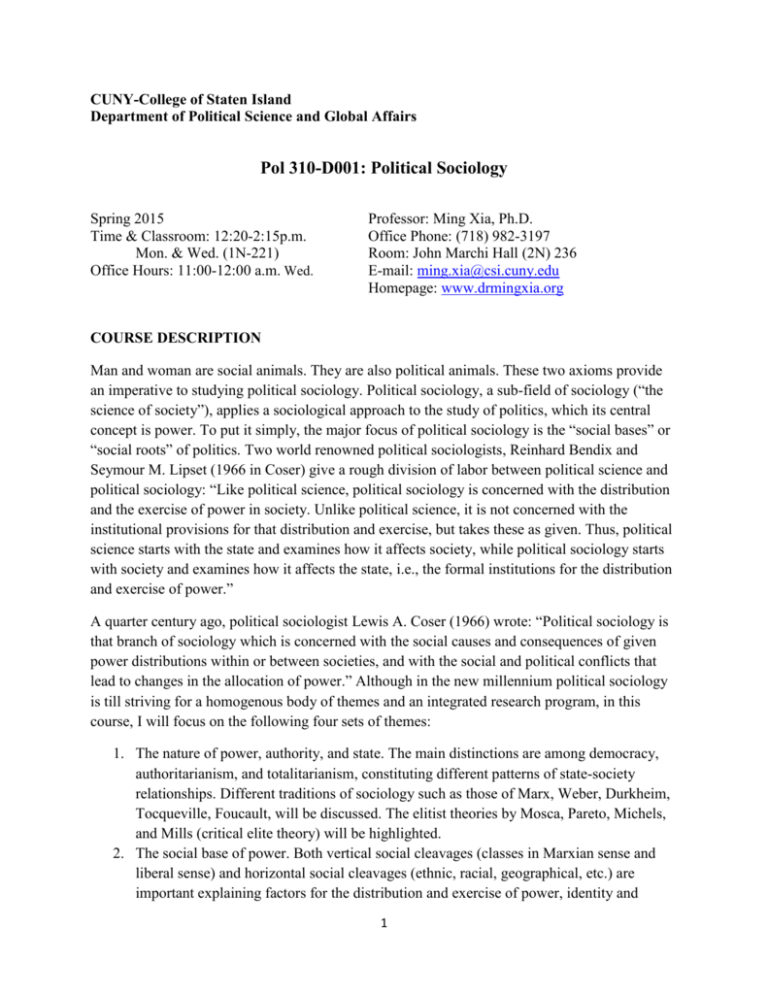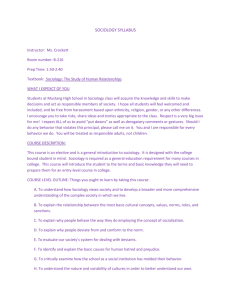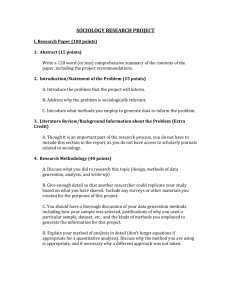
CUNY-College of Staten Island
Department of Political Science and Global Affairs
Pol 310-D001: Political Sociology
Spring 2015
Time & Classroom: 12:20-2:15p.m.
Mon. & Wed. (1N-221)
Office Hours: 11:00-12:00 a.m. Wed.
Professor: Ming Xia, Ph.D.
Office Phone: (718) 982-3197
Room: John Marchi Hall (2N) 236
E-mail: ming.xia@csi.cuny.edu
Homepage: www.drmingxia.org
COURSE DESCRIPTION
Man and woman are social animals. They are also political animals. These two axioms provide
an imperative to studying political sociology. Political sociology, a sub-field of sociology (“the
science of society”), applies a sociological approach to the study of politics, which its central
concept is power. To put it simply, the major focus of political sociology is the “social bases” or
“social roots” of politics. Two world renowned political sociologists, Reinhard Bendix and
Seymour M. Lipset (1966 in Coser) give a rough division of labor between political science and
political sociology: “Like political science, political sociology is concerned with the distribution
and the exercise of power in society. Unlike political science, it is not concerned with the
institutional provisions for that distribution and exercise, but takes these as given. Thus, political
science starts with the state and examines how it affects society, while political sociology starts
with society and examines how it affects the state, i.e., the formal institutions for the distribution
and exercise of power.”
A quarter century ago, political sociologist Lewis A. Coser (1966) wrote: “Political sociology is
that branch of sociology which is concerned with the social causes and consequences of given
power distributions within or between societies, and with the social and political conflicts that
lead to changes in the allocation of power.” Although in the new millennium political sociology
is till striving for a homogenous body of themes and an integrated research program, in this
course, I will focus on the following four sets of themes:
1. The nature of power, authority, and state. The main distinctions are among democracy,
authoritarianism, and totalitarianism, constituting different patterns of state-society
relationships. Different traditions of sociology such as those of Marx, Weber, Durkheim,
Tocqueville, Foucault, will be discussed. The elitist theories by Mosca, Pareto, Michels,
and Mills (critical elite theory) will be highlighted.
2. The social base of power. Both vertical social cleavages (classes in Marxian sense and
liberal sense) and horizontal social cleavages (ethnic, racial, geographical, etc.) are
important explaining factors for the distribution and exercise of power, identity and
1
citizenship. One major issue in a class approach to power is that the polarization and
antagonism between social elites and the lower/ underclass, the conflict between elitism
and political exclusion or marginalization. The creation, maintenance, and anemia of civil
society (and its further degeneration into its loss and the criminalization of society) will
be related to elitism versus political exclusion. To highlight the power and wealth nexus,
this course will focus on elites, elitism, oligarchs and oligarchies in history and across the
world.
3. The repertoire of social and political changes. Political Parties and electoral politics;
revolutions; social movements; communication, socialization, and propaganda through
mass media, in particular, the increasing importance of the internet, are being utilized for
hegemonic control by the state or elites or empowerment through counter-hegemonic
changes by the progressive forces. Social movements will be analyzed as a counterproject organized by citizens against the oligarchic tendency both at the national and
global levels.
4. State and society in globalization. The metamorphosis of capitalism through
globalization will be related to the domestic and global distribution of power and wealth.
Transnational movements, global civil society will be discussed as a possible vehicle for
social progress and global governance. The role of U.S. as the only superpower on the
world stage will be highlighted in our discussion on nationalism versus globalism.
The distinctive comparative-historical method will be applied to all four sets of discussion. The
following countries will be the main sources of empirical evidences: U.S., U.K., France, Sweden,
Italy, Russia, China, Indonesia, the Philippines, Singapore and India.
LEARNING OBJECTIVES AND ASSESSMENT
As a high-level course designed mainly for majors in political science and relevant social
sciences (e.g., sociology and social work, history, philosophy), this course expects to achieve the
following objectives:
Learning Objective
The student will be able to and gradually
feel comfortable to read abstract theoretical
works.
Learning Assessment Plan
Every student will be asked to read, summarize
and make oral presentation on textbooks in class
and will be graded on participation and applied to
the final grade.
The student will be able to identify at least
five great political sociologists and their
core contributions to political sociology.
In the midterm exam after the discussion on
theories having been completed, “pairing”
questions will be used to assess whether students
can connect core ideas and statements with
political sociologists.
2
The student will be able to develop critical
thinking ability on a variety of controversial
issues and eventually ascertain his/her
opinions backed up by reasons and
evidences.
During participation in class from each student
on the reading materials, I will ask follow-up
questions. In final examination, essay questions
will be used to test students’ ability for critical
thinking.
The students will develop ability to
understand, synthesize, assess, and critique
a non-fiction book for general audience.
Two book reviews will be completed by the
students to demonstrate their comprehension and
critical thinking of Mills’ & Gurr’ books.
The student will be able to carry out
research to collect data for supporting
his/her arguments.
The student will carry out a research by using
Lexis-Nexis to collect data on one of the two
topics: elite or underclass in the U.S or in any
other chosen country.
REQUIRED TEXTBOOKS
1. Berch Berberoglu, Political Sociology in a Global Era: An Introduction to the State and
Society (Paradigm Publishers, 2013)
2. C. Wright Mills, The Power Elite, New Edition, Afterword by Alan Wolfe (Oxford
University Press, 1999)
3. Ted Robert Gurr, Why Men Rebel (Fortieth Anniversary Edition, Paradigm Publishers,
2011, originally from Princeton University Press, 1971)
REFERENCE TEXTS (not required)
4. Kate Nash, Contemporary Political Sociology: Globalization, Politics, and Power
(Willey-Blackwell, 2010, second edition)
5. Jeffrey A. Winters, Oligarchy (Cambridge University Press, 2011)
6. Tavis Smiley and Cornel West, The Rich and the Rest of Us: A Poverty Manifesto (Hay
House, Inc., 2012)
7. Anthony M. Orum and John G. Dale, Political Sociology: Power and Participation in the
Modern World (New York: Oxford University Press, 2009).
8. Daniel Egan and Levon A. Chorbajian, ed., Power: A Critical Reader (Upper Saddle
River, NJ: Pearson Prentice Hall, 2005).
9. John Welshman, Underclass: A History of the Excluded, 1880-2000 (London & New
York: Hambledon Continuum, 200).
10. Karen Stanbridge and Howard Ramos, Seeing Politics Differently: A Brief Introduction to
Political Sociology (Oxford University Press, 2013)
CLASS ATTENDANCE
Class discussions and lectures will supplement and highlight materials in the readings. Regular
class attendance is necessary for you to master the materials of the course and it is expected by
the instructor. Students who miss classes have the responsibility to find out from classmates (or
the instructor) the material covered in that class. Excessive absence will make it impossible for
3
the instructor to have the opportunity to observe and therefore disqualify the instructor to
evaluate a student’s performances and achievements in this course. The instructor will be forced
to give either WU or F to students who do not have adequate attendance (4 absences will trigger
these two actions). If you have emergencies beyond your control, please inform the instructor
before your absence or immediately after your return to the class.
COURSE REQUIREMENTS AND GRADING
The final grade will be based upon the points from the completion of the following assignments
and examinations:
20%: Middle Term Exam (Definitions, “pairing” questions of key thinkers and their key ideas,
and essay questions).
30%: Two 4 page book reviews on Mills’ & Gurr’s books.
20%: Final Exam (Definitions, “pairing” questions of key thinkers and their key ideas, and essay
questions)
20%: Research Project (Two topics: “Is there ruling elite in U.S.?” or “Is there an underclass in
U.S.? You can ask the same questions in a chosen country. A 6-8 page report on your findings
through the Lexis-Nexis research).
10%: Participation and Attendance.
The grading will follow a 100 system and will be transferred to letter system by using the
following formula:
A: 93+, A-: 90-92; B+: 87-89; B: 84-86; B-: 80-83; C+: 77-79; C: 70-78; D: 60-70; F: Below 60.
COURSE SCHEDULE
Introduction
Jan. 28, 2015, Wed.
Introducing the Syllabus
Outline of the Class
Procedural Issues
Feb. 2, M.
Feb. 4, W.
Feb. 9, M.
Conventional Theories of the State
4
(Reading: Chap. 1 in Berberoglu, pp. 1-30)
Feb. 11, W.
Feb. 18 W.
Feb. 23, M
Fe. 25, W.
Marxist Theories of the State
(Reading: Chap. 2 in Berberoglu, p. 31-56)
March 2, M.
March 64 W.
The Origins and Development of the State
(Reading: Chapter 3in Berberoglu, pp. 57-70)
March 9, M.
March 11, W.
The Development of the Capitalist State
(Reading: Chapter 4 in Berberoglu, pp. 71-84)
Midterm Exam on March 11, W.
March 16, M.
March 18, W.
March 23, M.
March 25, W.
March 30, M.
April 1, W.
The Power Elite in America
(Reading: Mills, finish in five weeks)
Book Review Due on March 30.
Spring Recess: April 3-11
April 13, M.
April 15, W.
The Crisis of the Advanced Capitalist State
(Reading: Chap. 5 in Berberoglu, pp. 85-96)
April 20, M.
5
April 22, W.
The State in Less-Developed Countries
(Reading: Chap. 6 in Berberoglu, pp. 97-128)
April 27, M.
April 29, W.
The State, Social Movements and Revolution on a Global Scale
(Reading: Chap. 7 in Berberoglu, pp. 129-144; Chaps. 1-3)
May 4, M.
May 6, W.
May 11, M.
Discussing on Why Men Rebel?
(Reading: Chaps. 4-10)
Book Review on Gurr’s Due on May 11, M.
May 13, W.
Wrap and Review day!
(Reading: Conclusion in Berberoglu, pp. 149-160)
May 18, M
Final Exam!
Thank you for taking this class!
Have a happy summer!
6










